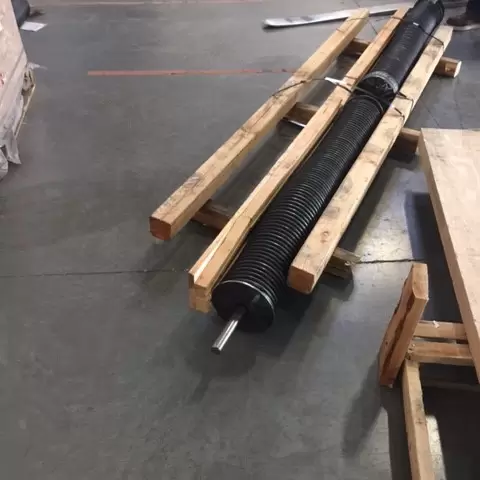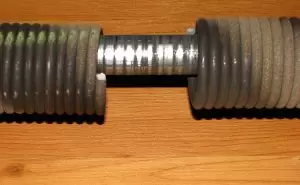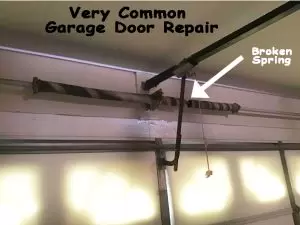
What Was That?
We often get phone calls from owners of homes and businesses saying that they just heard an explosion in their garage. Almost every time, it’s not an explosion – it may be your garage door spring breaking! Most garage door springs eventually break. For higher-quality doors, the springs may never break, but for cheaper garage doors such as on production homes, they may only last a few years or less!

The science tells us that the more you use your garage door, the quicker the springs break. It’s like bending a paper clip – when you bend it enough times, it breaks.
For example, common black garage door springs often break quickly. The Martin silver galvanized springs carry a lifetime warranty on the parts.
WARNING: DO NOT attempt to repair a broken garage door spring yourself! Thousands of people have been injured (or even killed) by a garage door spring. STAY AWAY from garage door springs. Never put your hands or any other part of your body near a garage door spring.
WARNING SIGNS YOUR GARAGE DOOR SPRING IS BROKEN:
- If you push the button and your garage door does not open (or if it is straining to open), the cause may be a broken garage door spring. Automatic operators are not made to lift doors with broken springs. The mechanism can break and the door may come crashing down!!
- When you look at the springs, one of them will usually have a gap in the wire where the fracture occurred.
- You will often hear a very loud noise when the spring breaks. The metal fractures and the spring spins around wildly.
- If you pull the red handle to operate your door by hand, if a spring is broken, the door will be very heavy and may be impossible to open.

Garage door springs play a crucial role in the operation of overhead garage doors, counterbalancing their weight and facilitating smooth opening and closing motions. However, it’s important to recognize that garage door springs, particularly torsion springs and extension springs, can pose significant dangers if not handled properly.
The Main Dangers Associated with Garage Door Springs
- High Tension: Garage door springs are under immense tension to support the weight of the door. Torsion springs, in particular, are tightly wound coils that store a significant amount of energy when compressed. If not handled with care, they can release this energy unexpectedly, causing serious injuries or even fatalities.
- Potential for Sudden Failure: Garage door springs have a limited lifespan and will eventually wear out over time due to constant use and exposure to environmental factors. When a spring nears the end of its lifespan, it may suddenly break or snap without warning, potentially causing the door to slam shut or fall unexpectedly.
- Projectile Hazard: When a garage door spring breaks or snaps, the sudden release of tension can propel metal fragments or pieces of the spring at high speeds, posing a serious risk of injury to anyone nearby. These projectiles can cause cuts, bruises, or even penetrating injuries.
- Damage to Property: A broken garage door spring can lead to the door becoming misaligned or falling off its tracks, resulting in damage to vehicles, property stored in the garage, or the garage door itself. Additionally, the sudden closure of a garage door due to a broken spring can cause damage to anything in its path.
- DIY Repair Risks: Attempting to repair or replace garage door springs without the necessary knowledge, skills, and safety equipment can be extremely hazardous. Improper handling of springs or using incorrect tools can increase the risk of accidents and injuries.
- Pinching and Crushing Hazards: Extension springs, which are typically found on older garage door models, can pose a risk of pinching or crushing fingers, hands, or other body parts if they become loose or dislodged during operation.
The best advice is that when you hear the explosion in your garage, call Martin for help!
Article by
Ken Martin – Manager

702-795-1000 – Call Now 24/7
6667 S Schuster StreetLas Vegas, NV 89118





